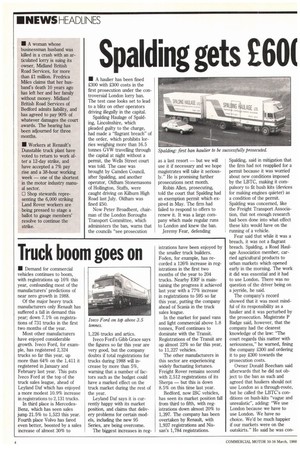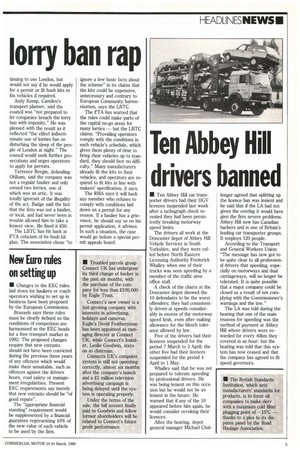Spalding gets £60(
Page 14

Page 15

If you've noticed an error in this article please click here to report it so we can fix it.
lorry ban rap
• A haulier has been fined £300 with 200 costs in the first prosecution under the controversial London lorry ban. The test case looks set to lead to a blitz on other operators driving illegally in the capital.
Spalding Haulage of Spalding, Lincolnshire, which pleaded guilty to the charge, had made a "flagrant breach" of the order, which prohibits lorries weighing more than 16.5 tonnes GVW travelling through the capital at night without a permit, the Wells Street court was told. The case was brought by Camden Council, after Spalding, and another operator, Oldham Stonemasons of Hollington, Staffs, were caught driving on Kilburn High Road last July. Oldham was fined £50.
Now Peter Broadbent, chairman of the London Boroughs Transport Committee, which administers the ban, warns that the councils "see prosecution as a last resort — but we will use it if necessary and we hope magistrates will take it seriously." He is promising further prosecutions next month.
Robin Allen, prosecuting, told the court that Spalding had an exemption permit which expired in May. The firm had failed to respond to offers to renew it. It was a large company which made regular runs to London and knew the ban.
Jeremy Fear, defending Spalding, said in mitigation that the firm had not reapplied for a permit because it was worried about new conditions imposed by the LBTC, making it compulsory to fit hush kits (devices for making engines quieter) as a condition of the permit. Spalding was concerned, like the Freight Transport Association, that not enough research had been done into what effect these kits would have on the running of a vehicle.
Fear said that while it was a breach, it was not a flagrant breach. Spalding, a Road Haulage Association member, carried agricultural products to urban markets which opened early in the morning. The work it did was essential and it had to use London. There was no question of the driver being on a joyride, he said.
The company's record showed that it was most mindful of its responsibility as a haulier and it was perturbed by the prosecution. Magistrate P Badge said, however, that the company had the clearest knowledge of the law: "The court regards this matter with seriousness," he warned, fining the company £300 and ordering it to pay 2300 towards the prosecution costs.
Owner Donald Beecham said afterwards that he did not object to the ban as such and agreed that hauliers should not use London as a through-route, but he called the LBTC's conditions on hush-kits "vague and unrealistic", adding: "We use London because we have to use London. We have no choice. We'd be much happier if our markets were on the outskirts." He said he was con firming to use London, but would not say if he would apply for a permit or fit hush kits to his vehicles if required.
Andy Kemp, Camden's transport planner, said the council was "not prepared to let companies breach the lorry ban with impunity." He was pleased with the result as it reflected "the effect indiscriminate use of lorries has on disturbing the sleep of the people of London at night." The council would seek further prosecutions and urges operators to apply for permits.
Terrence Bergin, defending Oldham, said the company was not a regular haulier and only owned two lorries, one of which was an attic. It was totally ignorant of the illegality of the act. Badge said the fact that the firm was not a haulier, or local, and had never been in trouble allowed him to take a lenient view. He fined it £50.
The LBTC has hit back at FTA criticism of its hush kit plan. The association chose "to ignore a few basic facts about the scheme" in its claims that the kits could be expensive, unnecessary and contrary to European Community harmonisation, says the LBTC.
The FTA has warned that the rules could make parts of the capital no-go areas for many lorries — but the LBTC claims: "Providing operators comply with the conditions in each vehicle's schedule, which gives them plenty of time to bring their vehicles up to standard, they should face no difficulty." Many manufacturers already fit the kits to their vehicles, and operators are required to fit kits in line with makers' specification, it says.
The RHA says it will back any member who refuses to comply with conditions laid down on a permit for any reason. If a haulier has a grievance, he should say so on his permit application, it advises. In such a situation, the case would go before a special permit appeals board.








































































































